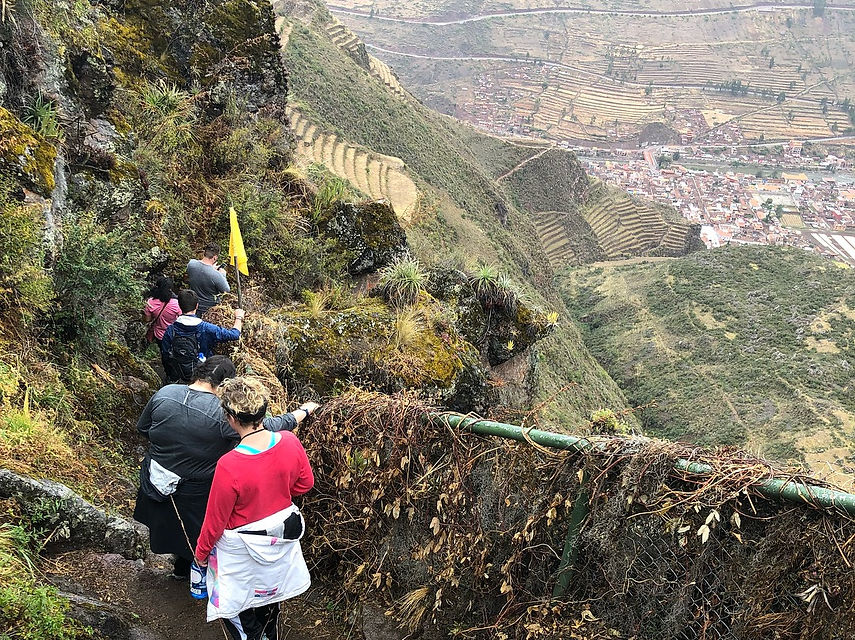
TEACHING
I teach courses in anthropology, writing, quantitative methods, museum studies, art history, critical identity studies, and environmental studies. The act of teaching can either reproduce or interrogate and re-invent our disciplines. In my classroom, both students and I are together generating and questioning knowledge through multi-directional learning. Influenced by Paulo Freire and bell hooks’s critical pedagogies, I approach teaching as a recursive learning process in which educators must constantly re-assess how we know what is "good teaching".
I begin the semester with critical discussions of epistemologies and situated knowledge. We evaluate how anthropology and other disciplines have formed within the societies in which practitioners have been enculturated: as a result, though anthropologists value anti-colonial and anti-racist approaches to humans, the discipline has been complicit in exclusionary and marginalizing practices. I design courses that make the field's development transparent and which position anthropology as a case study in knowledge production. Student work and assessment emphasize public writing, quantitative literacy, and multimodal writing about enduring social problems and their interventions. Courses are organized by: (1) method and theory contextualized historically and politically, (2) case studies on urgent social concerns, (3) student research using the social scientist’s toolkit, and (4) public engagement with and dissemination of knowledge for different audiences.
A workbook of course materials for teaching quantitative anthropology
I believe in sharing course materials so please reach out for more syllabuses or activities/assignments than what's already here.
Courses taught
George Washington University
University Writing 1020: Dining on the Past: Writing about archaeology and food
University Writing 1020: (Un)knowing the Human Past
University Writing 1020: Writing the Past for the Future: Archaeologies of Racism and Anti-racism
University Writing 1020: Writing Race, Measuring Marginalization
University Writing 1020: Embodied Inequality: Rhetoric of race and racism
Beloit College
Anthropology 100: Society and Culture (sociocultural anthropology)
Anthropology 110: Archaeology and Prehistory (link to related paper and supplementary materials zip)
Anthropology 120: The Human Animal (biological anthropology)
Anthropology 201: Research Design in Anthropology
Anthropology 219/Environmental Studies: Environmental Archaeology
Anthropology 220/Latin American & Caribbean Studies/Museum Studies 295: Dimensions of Identity
Anthropology 240: Quantitative Theory and Technique (published workbook)
Anthropology 247/Museum Studies 247: Anthropological Research in Museums
Anthropology 256/Art History 211: Pre-Columbian Art and Architecture
Anthropology 275: Exploration & Encounter: The Way to Cuzco (summer block course in Cuzco, Peru).
Anthropology 375/Critical Identity Studies 265: Empires, Past and Present
Anthropology 375/Critical Identity Studies 360: Coercion & Exploitation: Material Histories of Labor
Writing 100: Writing Seminar: Beyond Borders & Boundaries
Writing 200/Interdisciplinary Studies 210: Arguing about Numbers: The Rhetoric of Data
Southern Methodist University
Anthropology 2363: People of the Earth: The First Five Million Years
Anthropology/Cultural Formations A 3365: Rise and Fall of Superpowers: Dynamics and Ethics of Empire
Universidad Nacional de San Antonio Abad del Cusco
Archaeology 502: Workshop II – Archaeological Ceramics
A study on anti-colonial and anti-racist revisions to archaeology curriculum
Study of student learning outcomes across disciplines using museum objects
Teaching citation as a joyful practice, with undergraduate co-author S. Hagen Ohbi
Undergraduate TAs AmySue Greiff & Drew Agnew reflect on their experiences developing a new approach to archaeology courses





